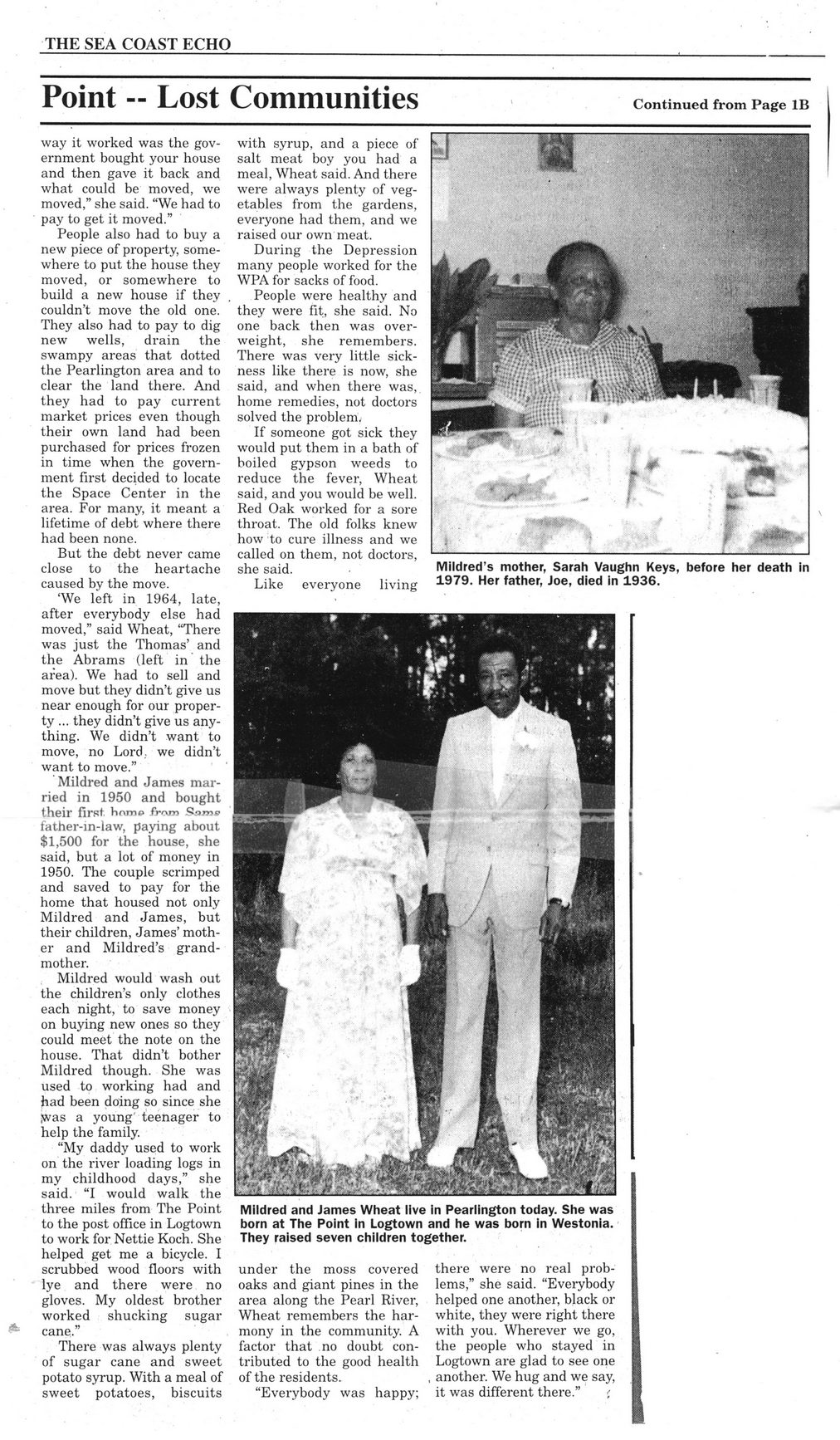This text was obtained via automated optical character recognition.
It has not been edited and may therefore contain several errors.
THE SEA COAST ECHO Point — Lost Communities Continued from Page IB way it worked was the government bought your house and then gave it back and what could be moved, we moved,” she said. “We had to pay to get it moved.” People also had to buy a new piece of property, somewhere to put the house they moved, or somewhere to build a new house if they couldn’t move the old one. They also had to pay to dig new wells, drain the swampy areas that dotted the Pearlington area and to clear the land there. And they had to pay current market prices even though their own land had been purchased for prices frozen in time when the government first decided to locate the Space Center in the area. For many, it meant a lifetime of debt where there had been none. But the debt never came close to the heartache caused by the move. ‘We left in 1964, late, after everybody else had moved,” said Wheat, “There was just the Thomas’ and the Abrams (left in the area). We had to sell and move but they didn’t give us near enough for our property ... they didn’t give us anything. We didn’t want to move, no Lord,, we didn’t want to move.” Mildred and James married in 1950 and bought their first, home from Sams father-in-law, paying about $1,500 for the house, she said, but a lot of money in 1950. The couple scrimped and saved to pay for the home that housed not only Mildred and James, but their children, James’ mother and Mildred’s grandmother. Mildred would wash out the children’s only clothes each night, to save money on buying new ones so they could meet the note on the house. That didn’t bother Mildred though. She was used to working had and had been doing so since she ,was a young' teenager to help the family. “My daddy used to work on the river loading logs in my childhood days,” she said. “I would walk the three miles from The Point to the post office in Logtown to work for Nettie Koch. She helped get me a bicycle. I scrubbed wood floors with lye and there were no gloves. My oldest brother worked shucking sugar cane.” There was always plenty of sugar cane and sweet potato syrup. With a meal of sweet potatoes, biscuits with syrup, and a piece of salt meat boy you had a meal, Wheat said. And there were always plenty of vegetables from the gardens, everyone had them, and we raised our own meat. During the Depression many people worked for the WPA for sacks of food. People were healthy and they were fit, she said. No one back then was overweight, she remembers. There was very little sickness like there is now, she said, and when there was, home remedies, not doctors solved the problem; If someone got sick they would put them in a bath of boiled gypson weeds to reduce the fever, Wheat said, and you would be well. Red Oak worked for a sore throat. The old folks knew how to cure illness and we called on them, not doctors, she said. Like everyone living Mildred’s mother, Sarah Vaughn Keys, before her death in 1979. Her father, Joe, died in 1936. Mildred and James Wheat live in Pearlington today. She was born at The Point in Logtown and he was born in Westonia. They raised seven children together. under the moss covered oaks and giant pines in the area along the Pearl River, Wheat remembers the harmony in the community. A factor that no doubt contributed to the good health of the residents. “Everybody was happy; there were no real problems,” she said. “Everybody helped one another, black or white, they were right there with you. Wherever we go, the people who stayed in Logtown are glad to see one another. We hug and we say, it was different there.” (

Logtown Lost communities of Hancock County - The Point (2)